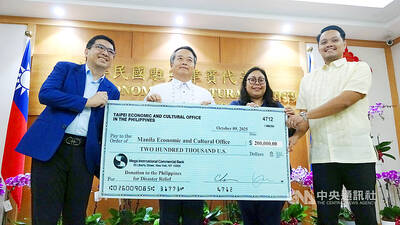Greenpeace Taiwan yesterday said that a pesticide residue test on vegetables sold at major retail outlets showed that 73 percent of the samples tested contained pesticide residue and 20 percent exhibited excessive pesticide levels.
The organization collected 60 vegetable and fruit products from brick-and-mortar and digital outlets of major supermarket and convenience store chains, including RT-Mart, Pxmart, Carrefour, Wellcome, A. Mart, Costco, 7-Eleven and FamilyMart, and 44 products tested positive for pesticide residues, 12 of which contained excessive residues and five contained forbidden pesticides.
Prohibited chemicals were found in oranges from A. Mart; oilseed rape, lettuce and jujubes from Carrefour; as well as passion fruit from A. Mart, the group said.
Green beans from Costco contained a fungicide residue 69 times higher than the legal limit, which stood out as the most serious violation among products with excessive residue levels, including oranges, green peppers, lettuce and passion fruits from A. Mart, spoon cabbages and arden lettuce from Carrefour, lemons from Pxmart, as well as grapes, lemons and Chinese cabbages from RT-Mart.
Only products collected from 7-Eleven and FamilyMart outlets showed no excessive residue, the organization said.
The test was a follow-up of a similar test conducted in October last year, which analyzed 69 products from eight retailers and found excessive residues in six products and prohibited pesticide in one product, it said.
“Consumers shopping for hot pot ingredients ahead of the Lunar New Year should avoid leaf vegetables, beans and peppers, which are prone to contain higher amount of pesticides,” Greenpeace project manager Lo Ko-jung (羅可容) said.
Singling out Costco as the worst performing retailer in terms of transparency and food safety policy, Lo said: “The solution to pesticide residue in food relies on retailers proposing specific measures to ban pesticide-containing products, but Costco ignores the consumer’s right to know because it has refused to disclose its pesticide management policy.”
Lo described Costco’s repeated claim that it followed both Taiwan’s and the US’ laws as an empty slogan, as the two countries differ largely in pesticide regulations, which would confuse the consumer and provide an excuse for the hypermarket chain to comply with standards it finds convenient.
Meanwhile, Carrefour has expanded its range of banned pesticides, from 40 percent to 70 percent of pesticides officially designated as highly toxic by the Council of Agriculture, she said.
Vegetables sold at 7-Eleven pose the least risk of pesticide exposure, as the retailer claims to sell only organic vegetables or crops produced during the transition period to organic production, she added.

A drunk woman was sexually assaulted inside a crowded concourse of Taipei Railway Station on Thursday last week before a foreign tourist notified police, leading to calls for better education on bystander intervention and review of security infrastructure. The man, surnamed Chiu (邱), was taken into custody on charges of sexual assault, taking advantage of the woman’s condition and public indecency. Police discovered that Chiu was a fugitive with prior convictions for vehicle theft. He has been taken into custody and is to complete his unserved six-month sentence, police said. On Thursday last week, Chiu was seen wearing a white

The Taoyuan Flight Attendants’ Union yesterday vowed to protest at the EVA Air Marathon on Sunday next week should EVA Airway Corp’s management continue to ignore the union’s petition to change rules on employees’ leave of absence system, after a flight attendant reportedly died after working on a long-haul flight while ill. The case has generated public discussion over whether taking personal or sick leave should affect a worker’s performance review. Several union members yesterday protested at the Legislative Yuan, holding white flowers and placards, while shouting: “Life is priceless; requesting leave is not a crime.” “The union is scheduled to meet with

‘UNITED FRONT’ RHETORIC: China’s TAO also plans to hold weekly, instead of biweekly, news conferences because it wants to control the cross-strait discourse, an expert said China’s plan to expand its single-entry visa-on-arrival service to Taiwanese would be of limited interest to Taiwanese and is a feeble attempt by Chinese administrators to demonstrate that they are doing something, the Mainland Affairs Council said yesterday. China’s Taiwan Affairs Office (TAO) spokesman Chen Binhua (陳斌華) said the program aims to facilitate travel to China for Taiwanese compatriots, regardless of whether they are arriving via direct flights or are entering mainland China through Hong Kong, Macau or other countries, and they would be able to apply for a single-entry visa-on-arrival at all eligible entry points in China. The policy aims

The government yesterday donated US$200,000 to the Philippines to support post-earthquake relief and recovery efforts, following a powerful magnitude 6.9 quake that struck Cebu Province late last month, killing at least 72 people and injuring 559 others. The donation was presented earlier yesterday by Representative to the Philippines Wallace Chow (周民淦) to Cherbett Maralit, deputy resident representative of the Manila Economic and Cultural Office, at Taiwan’s representative office in Manila. In his remarks, Chow expressed concern for those affected by the magnitude 6.9 earthquake that struck the central Philippines on the night of Sept. 30. "We sincerely hope for the earliest possible